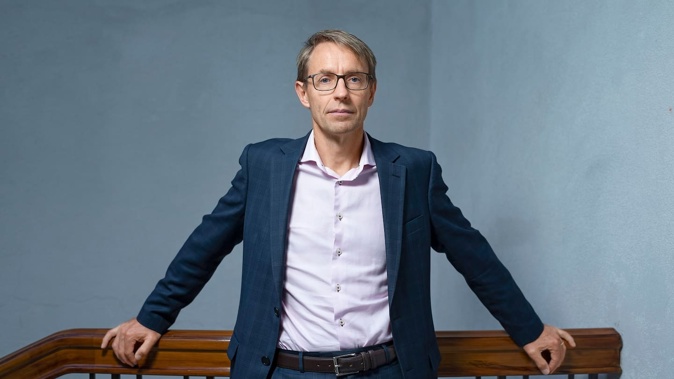
- Sir Ashley Bloomfield and prominent epidemiologist Professor David Murdoch have aired worries about the world’s ability to meet the next pandemic, citing a sense of ‘collective global amnesia’ about the last one
- They’ve listed steps that New Zealand could take itself, including annually updated pandemic plans and regular exercises
- A separate study published today finds health workers lacked the equipment and readiness to confront Covid-19
Two leading figures in New Zealand’s Covid-19 response have voiced worries the country could again be caught unprepared by the next pandemic – an inevitability they say should be treated as an immediate security threat.
This morning’s warning by former health boss Sir Ashley Bloomfield and prominent Otago University epidemiologist Professor David Murdoch comes as a separate study details how frontline workers lacked equipment and training when Covid first arrived here.
Nearly five years since it emerged in Wuhan, China, the ever-evolving coronavirus has been formally attributed to more than seven million deaths worldwide, including some 4437 in New Zealand.
But Bloomfield, who led the health system’s response, and Murdoch, who served on the Government’s vaccine taskforce, fear there’s now a sense of “collective global amnesia” about the catastrophe.
Writing in the New Zealand Medical Journal today, the experts argued that global investment in prevention, preparedness and response was “nowhere near the scale or speed necessary” to deal with the next “inevitable” event.
 Otago University epidemiologist Professor David Murdoch. Photo / Geoff Sloan
Otago University epidemiologist Professor David Murdoch. Photo / Geoff Sloan
“The risk is that we are falling into what has been dubbed ‘the cycle of panic and neglect’.”
The Ministry of Health recently updated the country’s national pandemic plan, while findings from the first stage of the Royal Commission of Inquiry into our Covid-19 response are due next month.
Bloomfield and Murdoch noted that the second stage of the inquiry wasn’t expected to begin reporting until early 2026 – which would be more than three years after the pandemic was officially declared over.
In setting out their own recommendations, Bloomfield and Murdoch said plans should consider pandemics as security threats, not just health threats, and should be updated annually, with exercises to run officials through different scenarios.
They also said the next pandemic response should be led by the Department of the Prime Minister and Cabinet (DPMC), to ensure threats to economic and social wellbeing, as well as public health, could be swiftly tackled.
In the case of Covid-19, they said it “became clear early on” that leadership structures quickly had to be re-thought.
“The complexity of the situation meant that no pre-existing framework could fully account for the range of challenges the pandemic threw up.”
Further down the chain, meanwhile, Otago University researchers report there was lacking training and readiness among more than 150 Christchurch Hospital workers surveyed over the emergency months of 2020.
About one-quarter were unsatisfied with equipment like personal protective equipment (PPE), while nearly all relied on mainstream or social media for Covid-19 information.
“These eye-opening findings underscore the need for urgent policy, training, and infrastructure improvements to better equip healthcare workers for future pandemics in New Zealand,” study co-author Dr Ibrahim Al-Busaidi said.
 Health workers fitted in PPE at the Ora Toa Covid-19 Testing Centre in Cannon's Creek, Porirua, in 2021. Photo / Mark Mitchell
Health workers fitted in PPE at the Ora Toa Covid-19 Testing Centre in Cannon's Creek, Porirua, in 2021. Photo / Mark Mitchell
A Ministry of Health spokesperson said a “fuller review” of New Zealand’s pandemic preparedness was planned to begin later this year.
“The updated pandemic plan is only one tool for developing health system’s preparedness and complements preparedness work across health services and wider society.”
The DPMC was also currently reviewing its national security system more broadly, they said.
That comes at a time global health authorities have been closely tracking a fast-evolving strain of avian flu that’s so far wiped out hundreds of millions of birds worldwide – and is likely to eventually arrive here.
While the H5N1 strain’s threat to people is still considered low, our health authorities already have a plan in place if a human avian flu case is detected, including rapid isolation and treatment with antivirals like Tamiflu.
As an outbreak could mean a high number of exposed people, the plan recommended a “stratified” approach with more intensive management and monitoring of those at highest risk.
In Covid-19′s case, Bloomfield and Murdoch wrote how New Zealand’s last-minute pivot away from an influenza-focused response made it clear that pandemic plans should be adaptable to different pathogens.
The ministry spokesperson told the Herald that respiratory viruses like flu and coronavirus still accounted for pandemics that had the biggest impacts here in the past, but acknowledged there were other pathogens that could drive them.
Jamie Morton is a specialist in science and environmental reporting. He joined the Herald in 2011 and writes about everything from conservation and climate change to natural hazards and new technology.
Take your Radio, Podcasts and Music with you









